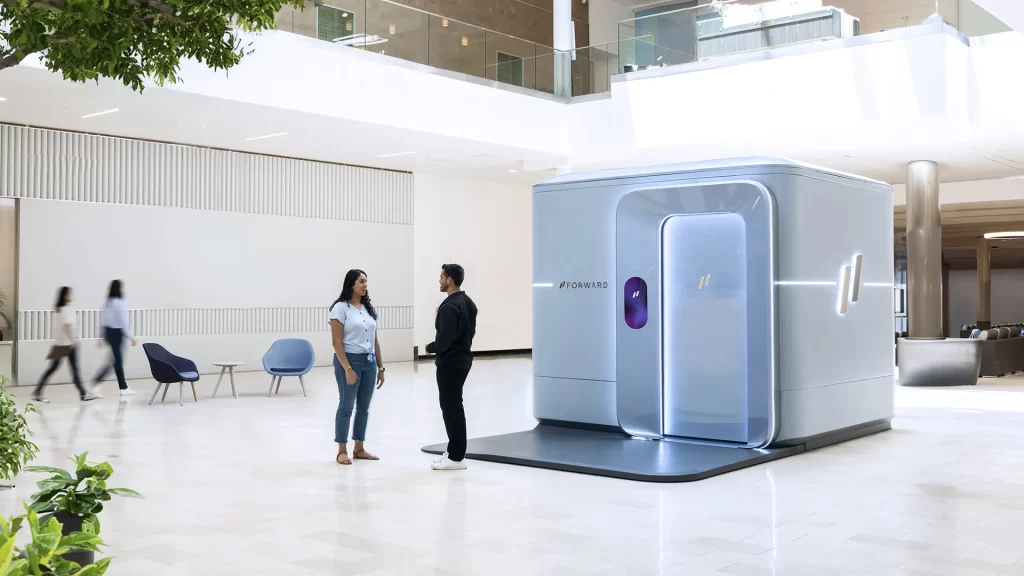
Now coming to a mall, gym or office building near you: A self-contained doctor’s office, powered by artificial intelligence, where you — the patient — draw your own blood and take your own vitals.
Why it matters: The traditional annual checkup is being disrupted in various tech-heavy ways, from telehealth to concierge medicine to the CarePod, above, a DIY health clinic-in-a-box.
Driving the news: A company called Forward is installing CarePods around the country, with the hope that people will visit them regularly for preventative care and specific concerns.
- After buying a $99-a-month membership, a patient uses their phone to unlock the door, sits in the chair inside, and runs through a series of health apps.
- You can do a biometric body scan, have your DNA sequenced, and test for hypertension, kidney disease and heart issues, among other things.
- Your results are reviewed by doctors offsite, or you can talk to a doctor virtually while you’re in the CarePod.
Of note: The first three CarePods are in Sacramento, California; Chandler, Arizona; and Chicago’s Willis Tower, with plans to roll out many more in 2024.
How it works: First, the machine takes baseline readings of your metabolic functions so it can assess how you’re doing over time.
- When you step inside, “it basically loads up a bunch of different apps for you to play with,” Adrian Aoun, founder and CEO of Forward, tells Axios.
- “Let’s say you choose the body scan app.” he continued. “This is pretty cool. It’s like, ‘Please stand still,’ and then it rotates you in a circle, takes a whole bunch of readings, shows you those readings on the screen, explains them to you.”
- If you choose the “heart health” app, “it actually opens a tray and hands you a sensor, shows you how to hold that sensor against your heart, takes the readings, then explains them to you.”
When asked how patients would draw their own blood inside a CarePod, Aoun whipped out a small vacuum chamber that suctioned to his upper arm and siphoned out a small sample.
- “In two to four minutes, this starts to fill up with blood,” he said. “There’s no needle, there’s no knife, and nothing hurts right now.”
- Aoun, who is not a doctor, called the device a “capillary blood draw” and made comparisons to a “leech or hickey.”
Skin scans and mental health screenings are also on the CarePod menu, and more tests will be added over time.
- “We’re constantly launching new sensors,” Aoun said. “So almost think of us a little like the iPhone” in the early days of the App Store.
- According to Forward’s literature, CarePods use “proprietary digital technology and AI-supported clinician reviews to develop highly personalized health plans and track progress via mobile phones.”
Backstory: Forward began by opening more traditional doctor’s clinics in about 20 cities. CarePods are “our Gen 2 product,” Aoun said.
- “We have over 100 doctors, and you can video with them whenever you want,” he said.
- Forward, which counts former Google CEO Eric Schmidt as an investor, announced in November that it had raised $100 million to build and deploy CarePods.
Zoom out: Amazon is getting into this space as well with Amazon Clinic, offering video visits and messaging with clinicians for common maladies.
- Other services — like Doctor on Demand and MDLive — also offer telehealth, but without the physical locations or on-site scans and monitors.
What they’re saying: “If Elon has the self-driving car, well, this is the autonomous doctor’s office,” said Aoun, a heavyweight technologist who previously ran artificial intelligence at Google and special projects for Larry Page, a former Google CEO.
- Aoun sees the CarePod as a way to get basic health care services deployed broadly, despite global shortages of health care professionals.
- “You’re never going to scale doctors and nurses to the whole planet,” said Aoun, who previously founded urban innovation company Sidewalk Labs. “So instead we said, ‘Well, instead of health care being a service, maybe we should rebuild health care as a product.”
- “Maybe we should take every single thing that doctors and nurses are doing, and just slowly but surely try and migrate it over to hardware and software.”
Yes, but: Forward doesn’t take insurance, and $99 a month is a big ask for an untested concept. (Aoun says he’s aiming to get the price way down.)
- Telemedicine is full of potential ethical and logistical pitfalls.
- Some people might worry about entrusting their care to such an unorthodox system — couldn’t something important get missed?
By the numbers: Nearly 30% of patients don’t see a primary care doctor these days, according to an analysis by FAIR Health.
What’s next: As it rolls out CarePods nationally, Forward is looking to add services such as flu shots, which it hopes to do if skin patch vaccines are approved.
- “We’re just going to keep going until we can deliver all this awesomeness for pennies on the dollar for the whole planet,” Aoun said.


























